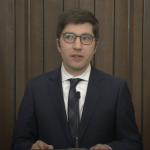TORONTO — A late June conference that brought together more than 70 Jewish and Christian leaders launched a multi-year project to combat the dramatic rise of antisemitism in Canada.
The Simeon Summit Initiative, a collaboration between the Centre for Israel and Jewish Affairs (CIJA), United Jewish Appeal of Greater Toronto, Macdonald-Laurier Institute and Cardus, brought together rabbis, pastors and lay leaders for two days of conversation and planning.
Organizer Fr. Deacon Andrew Bennett, director of Faith Community Engagement at Cardus, was responsible for the Canadian Christian Declaration on Antisemitism that has been signed by more than 700 Canadian Christian leaders since its launch last September.
“Antisemitism is not a Jewish problem. Antisemitism is a problem for Christians and for our fellow non-Jewish citizens. We must deal with it, and to do so we must educate ourselves about it,” Bennett told The Catholic Register.
Though the summit examined antisemitism through the lens of faith, by people of faith, Bennett stressed the event should influence the wider Canadian society.
“This is for the sake of our country. I have been caught up in some of these pro-Hamas rallies in Toronto and Montreal and other places that I travel. I have never seen protests that are so angry with such vitriolic language. I do not recognize this as Canada. Free expression is one thing, incitement to violence is another,” he said.
The summit served as a kick-off to what Bennett described as a “year of encounter.”
“I explicitly do not use the term dialogue. This is not interfaith dialogue,” said Bennett.
Canada’s former ambassador for religious freedom reported that many participants questioned the usefulness of “interfaith dialogue” in light of the Oct. 7, 2023 attack on Israeli citizens by Hamas.
“They were asking, ‘What did it do when 1,200 Jews were brutally massacred? Where were the voices then?’ So, we’re focused on encounter, which I believe is much deeper.”
That depth was facilitated by honesty about the distinct beliefs of Christians and Jews, and the questions each group has of the other.
“There was a lot of honest conversation. One rabbi came up to a colleague of mine and said, ‘I have been involved in interfaith dialogue and Jewish-Christian dialogue for many years and there were two words that kept coming up at this summit that I had never heard in other dialogues.’ My colleague said, ‘Oh, what were those two words?’ And the rabbi said, ‘Jesus Christ.’
“There was no equivocating, there was no mushy middle. There was no lowest common denominator. It was authentic,” said Bennett.
Honesty combined with good-faith conversation proved to be a winning combination.
“I think I would just want to emphasize the amount of joy that there was at the summit,” said Bennett.
Montreal Archbishop Christian Lépine was the only Catholic bishop to attend the Simeon Summit.
Bennett said he appreciates that parish priests and bishops are busy and that a two-day commitment is a big ask.
“Bishops have busy schedules and so forth, and I applaud those priests and religious who signed on to the declaration and who have shown a genuine interest, but I think as Catholics, we can do better,” he said. “I would absolutely love for more of the bishops to speak out on this, but that also it’s incumbent upon me to engage them and to inform them what this is all about. I hope to have some opportunity to do that in the near future.”
Though engagement with the Catholic episcopate is on the agenda, the plan for the “year of encounter” between Christians and Jews is that it will be largely directed by the laity.
“The goal is to now pair up rabbis and pastors and their congregations across the country. Women’s groups, men’s groups, young adults, coming together to just get to know one another as Christians and Jews. What does it mean to be a faithful Christian in Canada? What does it mean to be a faithful Jew in Canada?”




